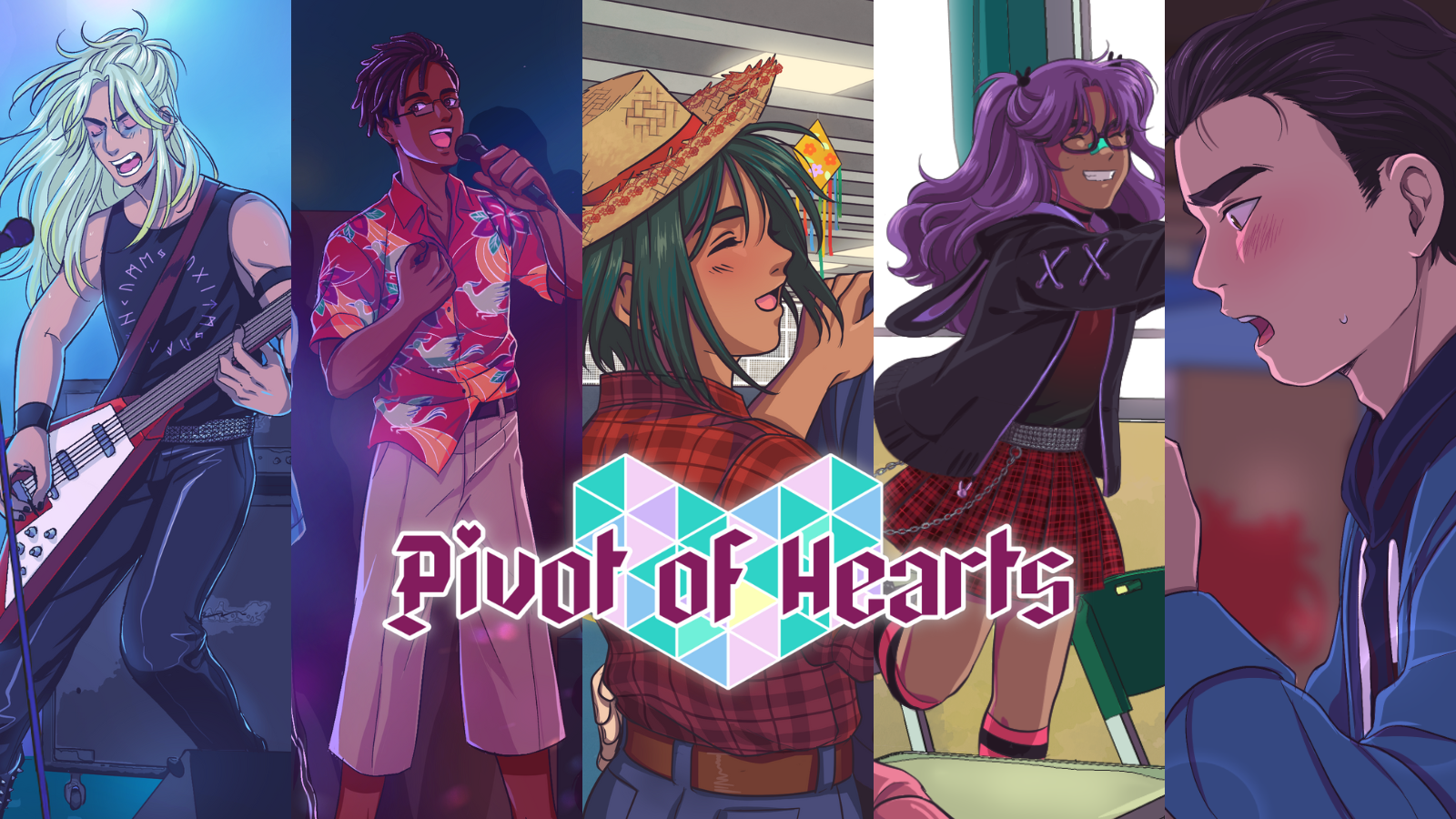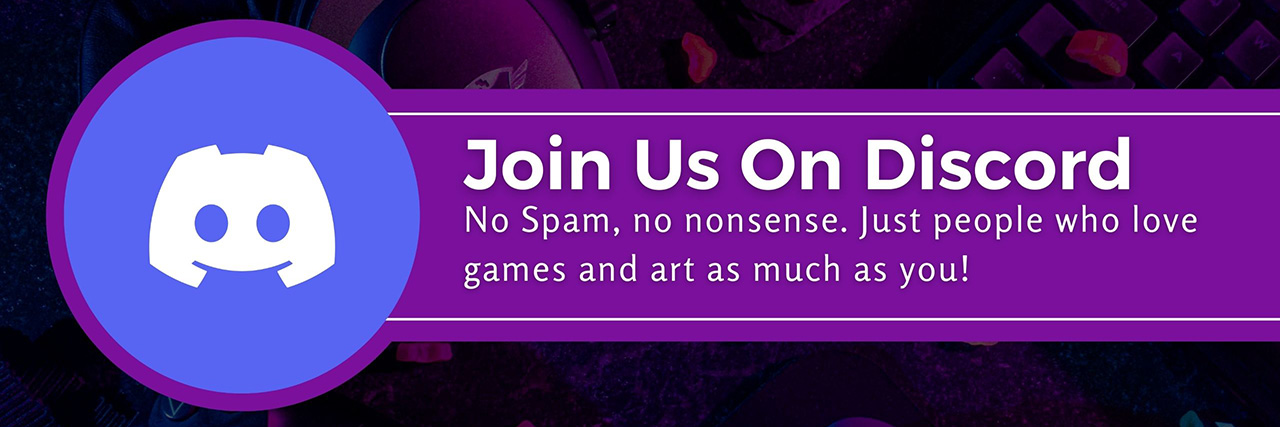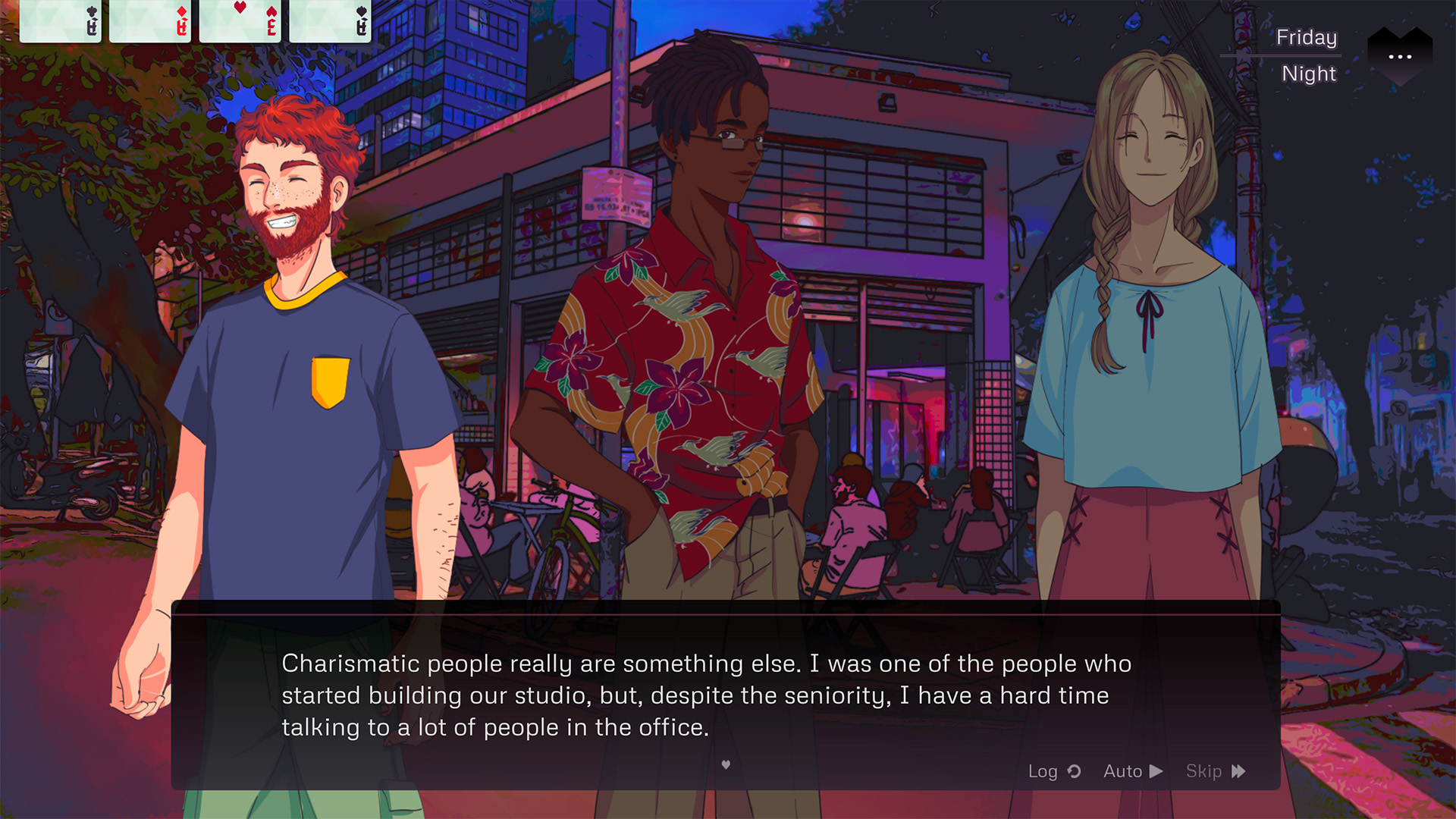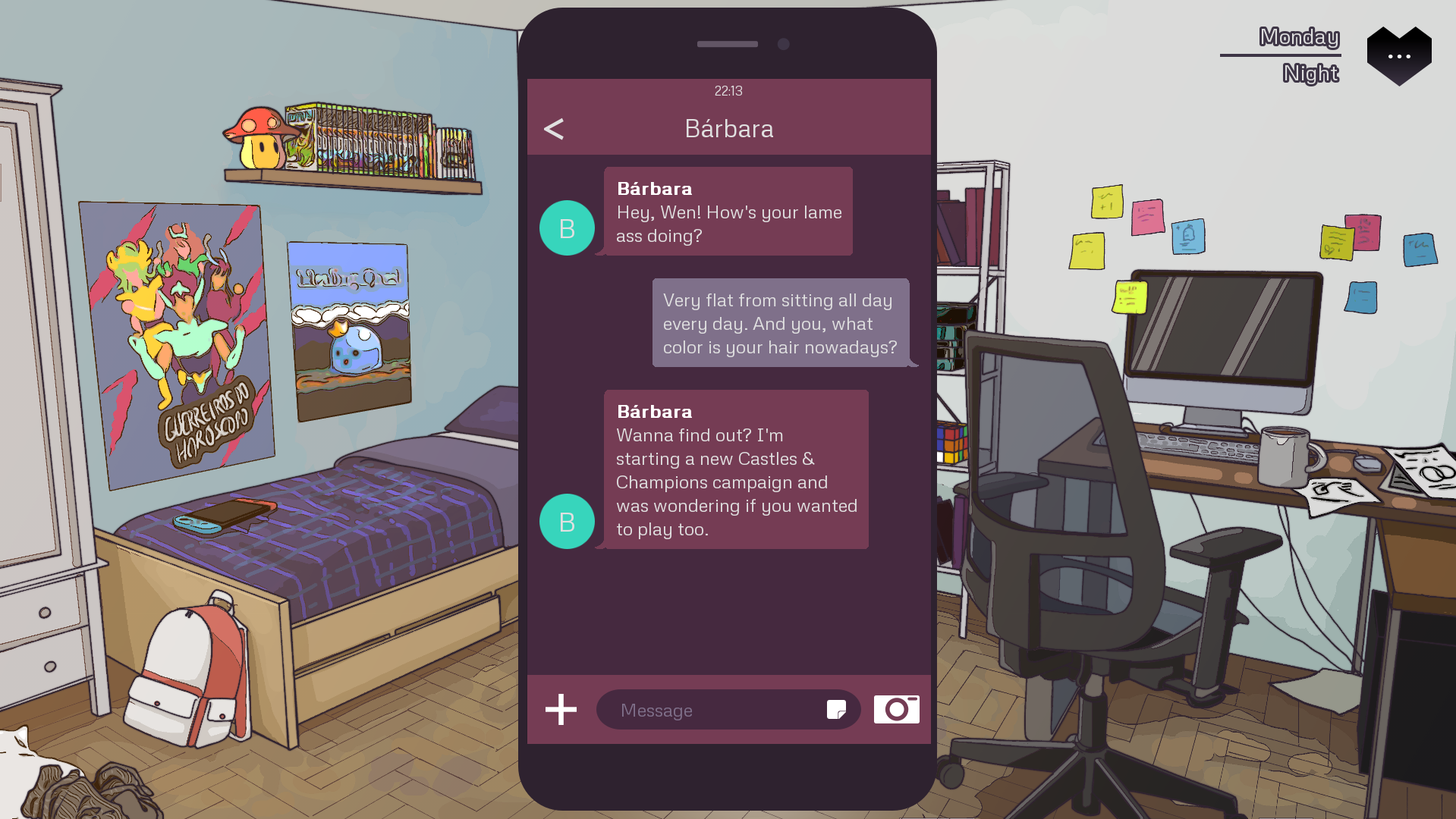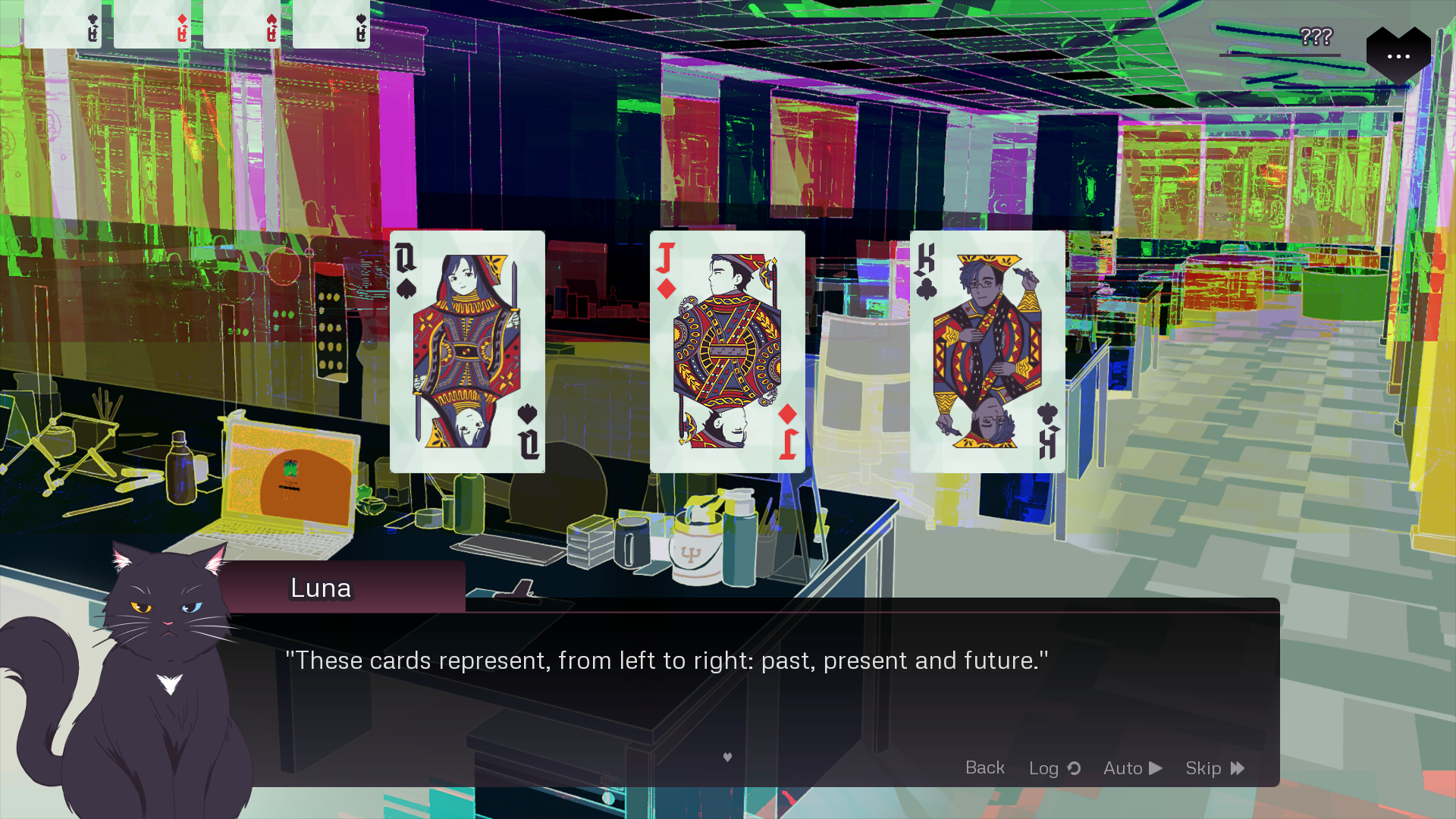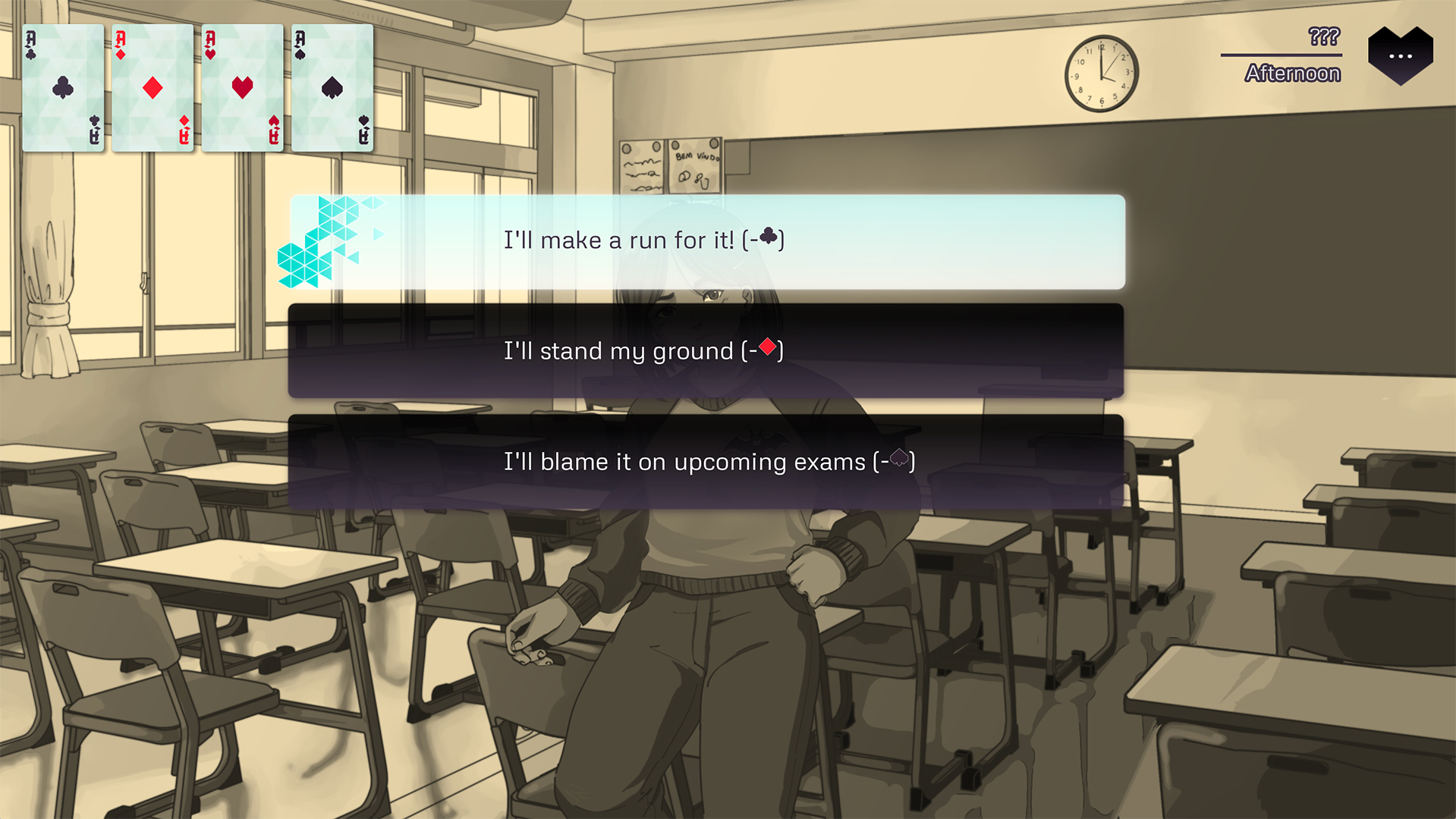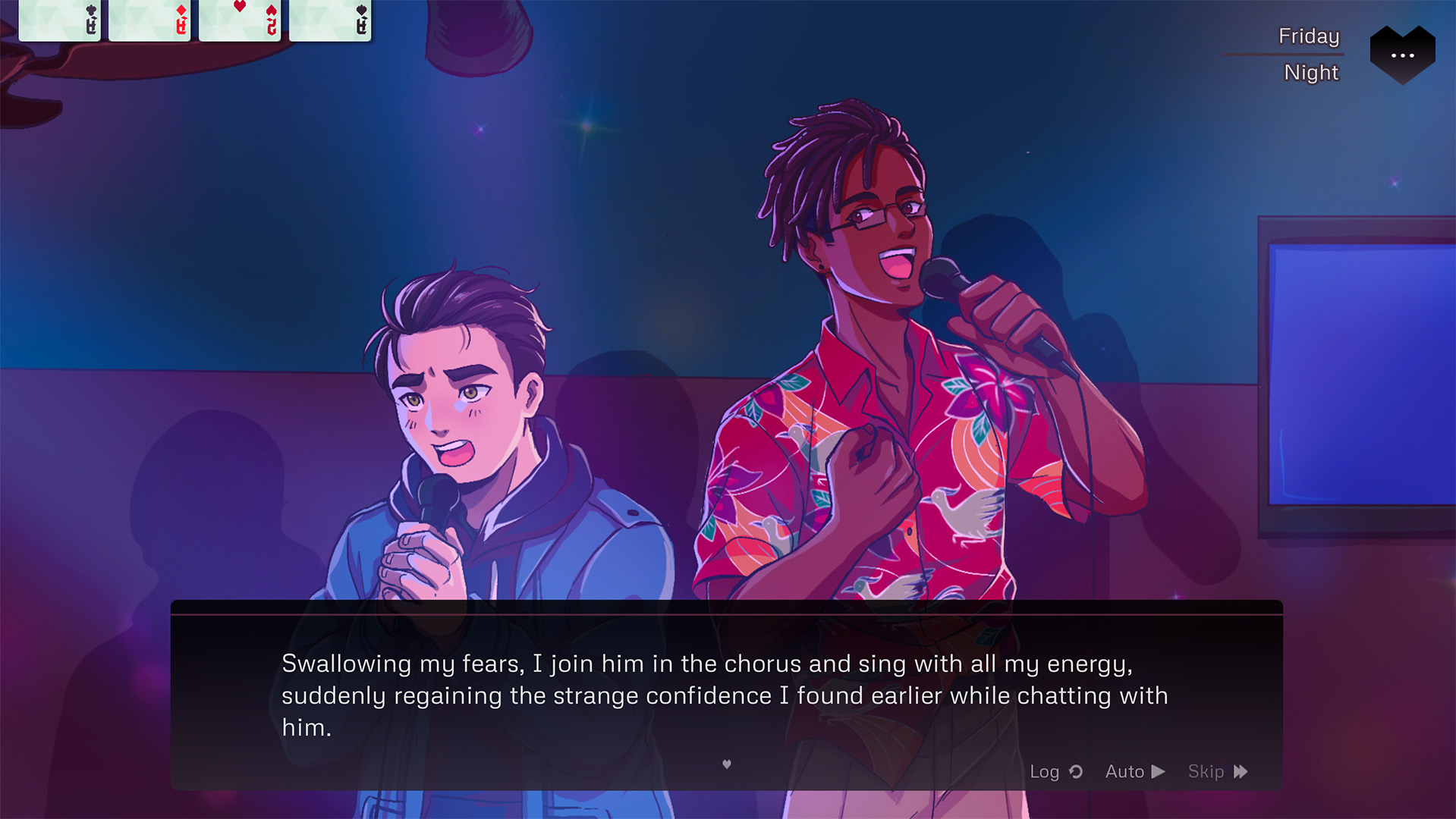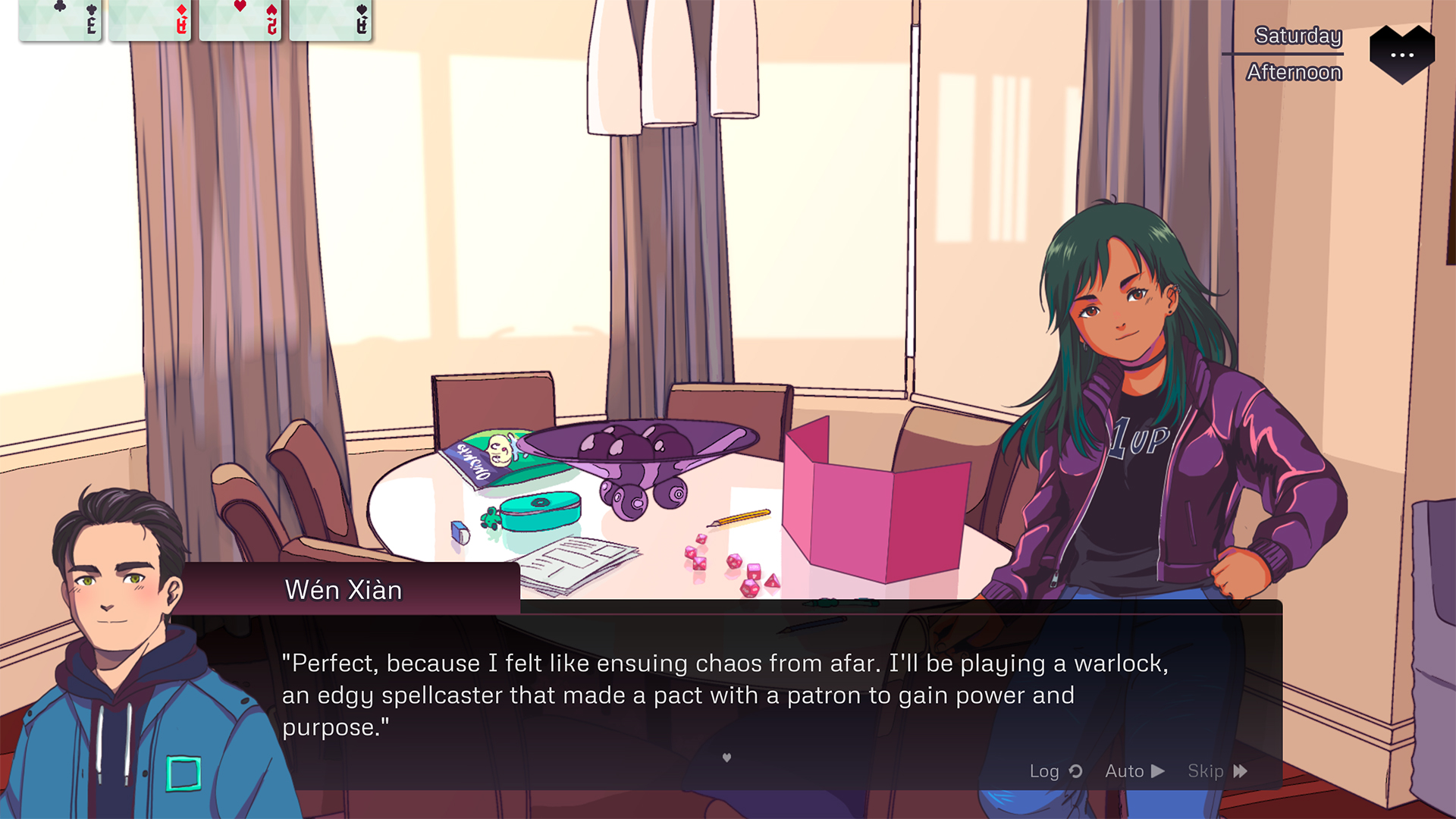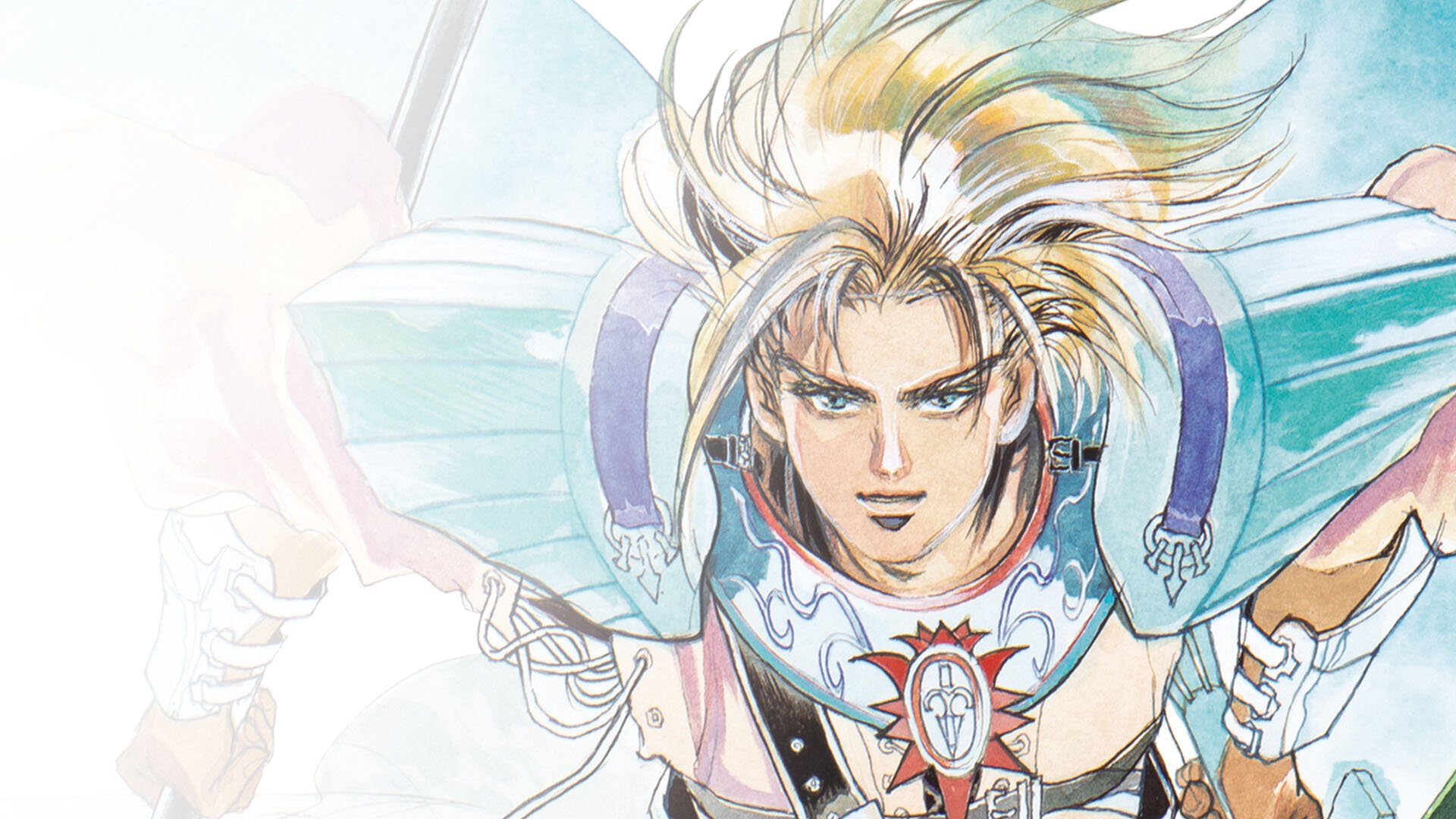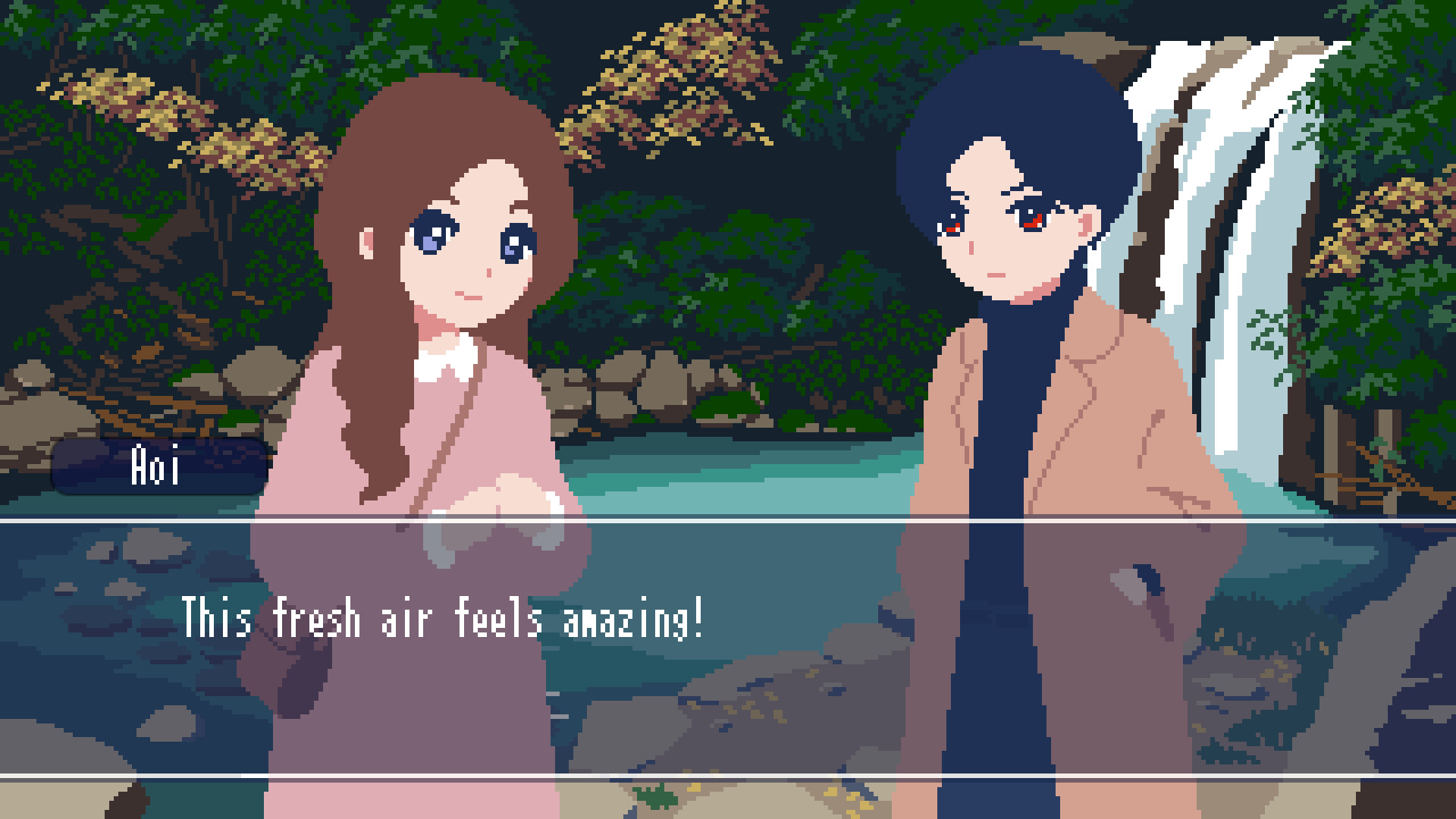Brazilian indie developer Dragonroll Studio has been making games since 2019, but until now, they have all been game jam or free titles. Its focus is on making cute, subversive games. The team is poised to launch its first premium game, visual novel Pivot of Hearts. (A free demo is available via Steam.) Set in the vibrant heart of São Paulo, Brazil, the game explores representation, inclusion, queer identity, non-monogamous relationships, and self-discovery. Players shape the journey using a tarot-inspired game mechanic.
DDNet recently had the chance to ask the folks at Dragonroll Studio questions about the upcoming title, its inspiration, and its game mechanics. The interview is with Lívia Amaral Santos (LAS), Art Director at Dragonroll Studio; Livia Maki Yoshikawa (LMY), Executive Producer at Dragonroll Studio; and Wilson Kazuo Mizutani (WKM), Lead Developer at Dragonroll Studio.
What is the game development scene in Brazil like at the moment?
WKM: In the last fifteen years, we have already seen many successful games from Brazil or featuring prominent Brazilian developers. Titles such as Chroma Squad, Momodora, Celeste, Mullet Madjack, and Astrea are just a few from the top of my head. There are also a couple of giant mobile companies, such as Wild Life. But, more importantly, this period also gave rise to a vibrant and highly active indie scene. In São Paulo, we currently have local gatherings and events every month, showcasing several amazing games of all types and genres. One of the most important factors for this in more recent years has been the many government initiatives to support the local games industry, with public funding grants as well as incubation and acceleration programs. Besides, I believe the transition of BIG Festival into Gamescom Latam also makes our city one of the most important locations for the games industry in Latin America.
LAS: One thing that’s also worth pointing out is that public grants and incubation/acceleration programs have been a great help kick starting small studios like us. With some of the cultural relief funds that came out after the pandemic, I’m sure we’ll see many new cool games and studios coming up.
How are any of your life experiences reflected in the game (if you’re comfortable sharing)?
LAS: We’ve all had different experiences that have made us question normative relationship dynamics. It’s usually not a 1:1 thing, but we do sprinkle a lot of our own experiences in the story. From things like the tension that exists between a queer person and their family, to little details like “the power was out at the office so I got to bond with some co-workers for the first time”. In general, we fill in a lot of blanks with little bits from our lives.
WKM: A very dear aspect of the game in this regard to me is the representation of the Asian diaspora we have in Brazil. I don’t think it’s very known outside our country, but Brazil has the largest Japanese immigrant population in the world — and that is only a part of the many Asian groups that made their home here. I also have a lot of fun portraying geek and nerd culture the “Brazilian way”, something that worldwide media rarely touches on, being mostly focused on soccer, carnival, and other, more famous parts of Brazilian identity that, nevertheless, are far from properly representing our country’s idiosyncrasies.
LMY: For me, there’s life in São Paulo, having lived there my entire life: the urban culture, leisure activities, riding the subway, the chaos of rush hour, the huge variety of food you can find in the city, and so on. There’s the depiction of how Asian culture manifests in Brazil, like Wilson has mentioned. And there’s non-monogamy, which is the relationship arrangement I chose for myself. This central theme in the game is a reflection of the lack of representation of non-monogamy in media in general. When it does show up, it’s always portrayed as something promiscuous or not to be taken seriously, so we wanted to have a realistic and non-stereotypical approach to the theme in Pivot of Hearts. The game also features bisexual experiences, a subject that I miss a lot in mainstream media.
What inspired the game’s tarot-like mechanics?
WKM: The initial spark came from the game’s name itself. We chose “Pivot of Hearts” because, among other reasons, it sounds like the name of a card, like “Queen of Hearts”. From there, the idea of incorporating cards into the games took form. The main struggle of the protagonist is in the sphere of feelings and emotions, so we wanted the cards to somehow represent that. Making the jump to tarot as a tool for mapping cards to emotions was a natural step at this point, but games like the Persona series, with its ever-present tarot symbology, and Disco Elysium, which brought the character’s psyche into the choice-based narrative gameplay, were also strong inspirations.
How do the tarot-inspired mechanics interact with the typical visual novel-style gameplay?
WKM: Like most visual novels, the core of the gameplay in Pivot of Hearts comes from the player choosing what the protagonist does from a predetermined set of choices during key points of the story. However, in our case, we further divided these choices into two types: one that gives points associated with a card suit, and one that spends those points. The first type consists of choices about what the character wants to do with their time, who they want to talk to, and other minor decisions like that. These interactions feed them the different types of suit points, representing different “emotional energies” tied to the suits. Then, the second type consumes those points by demanding emotional investment from the protagonist, and there is always a “free” choice. This way, the most desirable choices have a cost, and the player has to strategize a bit to make sure Wen is on good terms with all the characters they like.
The tarot deck used in the game is a standard suite of four cards from a regular deck of cards, representing the four types of cards in tarot’s minor arcana. Why use a regular deck and not a deck incorporating swords, wands, cups, and pentacles?
LAS: In the game we refer to the suits as spades, clubs, hearts and diamonds (probably because we were more used to the French suits), but they serve the same symbolic purpose — spades has to do with logical thinking, hearts with being in touch with one’s emotions, and so on. We wanted to keep things fairly simple and recognizable, so even if a player is unfamiliar with tarot, they’ve probably played with a regular deck of cards before.
WKM: Also, playing card games — such as the infamous Brazilian truco — in bars, parties, and college halls is a widespread part of Brazilian culture. It reaches the point where “people yelling while playing cards in public spaces” is such a commonplace complaint that everyone hears it at least once in their life.
How is São Paulo’s culture incorporated into the game?
WKM: It’s represented both in the spaces the characters go through in the story and the social activities they participate in. Liberdade or the Cultural Center of São Paulo are iconic places people in São Paulo go to hang out, and Paulista Avenue is the most important avenue in the city, be it for business, tourism, nighttime celebrations, or family time on Sundays. These all show up in the story as background illustrations we commissioned based on real photos of those places. There are also a handful of lesser-known spots that nevertheless portray the “Brazil/São Paulo feel” in their urban aesthetics. For the social activities, we have things like Festa Junina (“June Festival”), which vaguely resemble Japanese Summer festivals (matsuri), bearing typical colorful decorations lined with food and game stalls. There are also a few geek-oriented activities which are very common in our local shared experiences, such as playing tabletop RPGs and Super Smash Bros. matches during social gatherings.
Are there any concerns that some of the game’s content, like non-monogamous relationships, might be seen as controversial? How would you deal with this situation?
LAS: We’re taking a “soft-power” approach. We didn’t want to make something preachy, but rather, welcome the players into a comfortable, familiar setting, and create a narrative that would invite them to reflect upon relationship structures beyond what we are told is the norm.
WKM: The idea is to foster the notion on the player’s head little by little, using things like the ludonarrative argument present in the card mechanics and the many subplots that complement and support the central message of the narrative. We intend that by the latter parts of the story, non-monogamy stops being a surprise and becomes the missing piece of the puzzle instead.
That said, there is indeed some concern with some eventual pushback on the theme. While most of our experiences so far have been great, it’s a very sensitive topic with values deeply ingrained into the structures of our society. Being a very small team still in the beginning of its journey, it’s a situation where we have to know when and how to engage to avoid shooting ourselves in the foot.
There are five endings. How do the narrative paths interact with each other? Are there five branches, or do they intersect at various points in time?
LAS: The game follows a main story, with a few deviations, until chapter 3 ends. The last chapter is when the narrative paths go in totally different directions depending on the choices made up to that point. It’s also worth mentioning, one of the endings is “special” and may only be reached under very specific circumstances, so we hope players will play through many times to reach all the possibilities!
What do you hope players take away from playing Pivot of Hearts?
WKM: First of all, I hope they see themselves in the characters one way or another. For Brazilians, specifically, I hope they can be proud to be featured in a game being sold worldwide. And I hope that, in seeing themselves in the game, people understand and empathize with the characters’ decisions, reflecting on how our lives twist and squeeze to fit into the many assumptions about what is a desirable romantic relationship.
What is next for your team post-launch?
WKM: There are two goals for Dragonroll Studio post-launch. The first is to finish some extra accessibility features we have planned for Pivot of Hearts and patch them in over the following months. The second is to start work on a second title, which we have yet to elaborate on. We won’t restrict ourselves to visual novels or even romance games, but we do intend to stick to Dragonroll Studio’s motto: making cute yet subversive games.
Buy the hottest games with Amazon.
By purchasing from this link, you support DDNet.
Each sale earns us a small commission.

